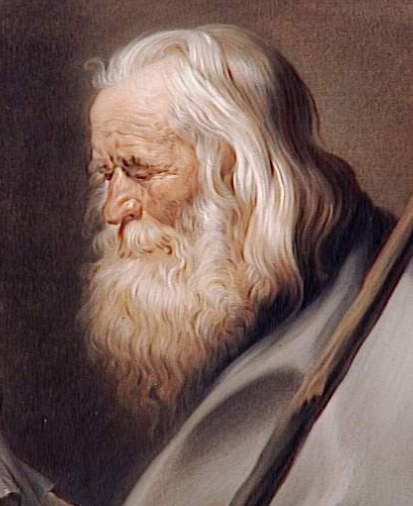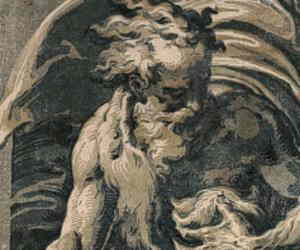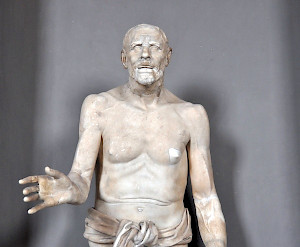

It is clear that he, seeing the changing of the four elements into each other, thought it right to make none of these the substratum, but something else besides these and he produces coming-to-be not through the alteration of the element, but by the separation off of the opposites through the eternal motion. And the source of coming-to-be for existing things is that into which destruction, too, happens 'according to necessity for they pay penalty and retribution to each other for their injustice according to the assessment of time,' as he describes it in these rather poetical terms. He says that it is neither water nor any other of the so-called elements but some other apeiron nature, from which come into being all the heavens and the worlds in them.

Of those who say that it is one, moving, and infinite, Anaximander, son of Praxiades, a Milesian, the successor and pupil of Thales, said that the principle and element of existing things was the apeiron being the first to introduce this name of the material principle. The Neo-Platonist philosopher Simplicius (l. Nothing is known of Anaximander's life but his work was considered so significant that it was referenced at length by later writers. Among his major contributions to philosophical thought was the above-mentioned claim that the 'basic stuff' of the universe was the apeiron, a philosophical and theological claim which is still debated among scholars today and which, some argue, provided Plato with the basis for his cosmology. He traveled extensively and was highly regarded by his contemporaries. Anaximander invented the idea of models, drew the first map of the world in Greece, and is said to have been the first to write a book of prose. Recent scholarship argues that he, rather than Thales, should be considered the first western philosopher owing to the fact that a direct and undisputed quote from Anaximander exists (even if it is only one sentence) while not even a fragment still exists by Thales. The apeiron was a cosmic force bringing together and dispersing matter but its precise form is unclear as all of Anaximander's work has been lost and is only known through a single sentence and references in later writer's works. Thales claimed the First Cause was water which Anaximander rejected and replaced with the concept of the apeiron defined as "the unlimited, boundless, infinite, or indefinite" (Baird, 10). 585 BCE), recognized as the first philosopher of ancient Greece, who holds this distinction as the first to initiate philosophical inquiry into the nature of existence in trying to define a First Cause for the creation of the world. He was a student of Thales of Miletus (l. 546 BCE) was one of the early Pre-Socratic Philosophers who lay the foundation for the deveopment of Western Philosophy. If you grant me this, and agree that they exist, I hope to be able to show you what my cause is, and to discover that the soul is immortal.Īnaximander of Miletus (l.

I will go back to what we have so often spoken of, and begin with the assumption that there exists an absolute beauty, and an absolute good, and an absolute greatness, and so on. These thinkers puzzled over big questions like who are we, why are we here and where are we going? and they provided some of the most interesting, influential and inspiring answers ever made anywhere. It wasn't all heavy thinking with Democritus known as the 'laughing philosopher' for his cheerfulness, Epicurus with his emphasis on pleasure and Diogenes who wandered through the streets of Athens with a lamp looking for an honest man. We look at the pre-Socratic philosophers and the titan trio of Socrates, Plato and Aristotle, as well as the wizard of numbers Pythagoras, Heraclitus, whose thoughts were so deep they called him the 'dark thinker', and Zeno who posed his enigmatic paradoxes.


 0 kommentar(er)
0 kommentar(er)
